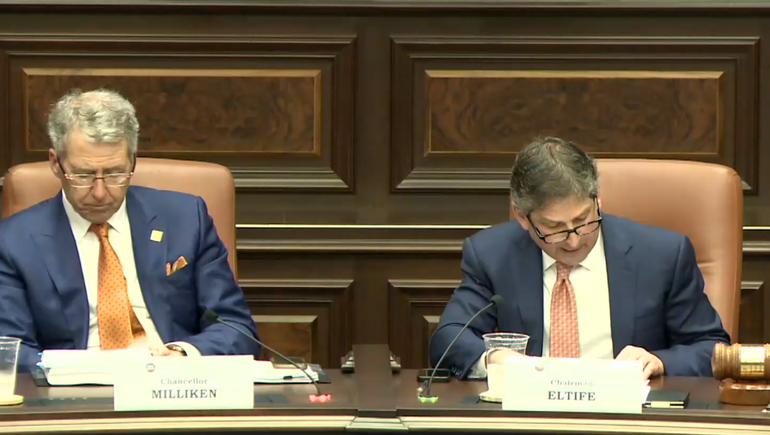[ad_1]
The University of Texas System, one of the largest public higher education networks in the U.S., has paused creation of new diversity, equity and inclusion policies following pledges by conservative state lawmakers to scale back DEI efforts among colleges.
The announcement, made Wednesday, represents the latest development in a Republican campaign unfolding in states across the country to more heavily control curricular choices and curtail diversity initiatives in postsecondary education.
Animus toward DEI work has proliferated in several GOP-led states, but few as visibly as Texas, where the lieutenant governor has named eradication of diversity practices in higher ed a legislative priority. Similarly, in Florida, Gov. Ron DeSantis has promised to dismantle these types of programs.
Much of the pressure to eliminate DEI policies stems from politicians, but the UT system’s pause is particularly notable because it comes from its governing board. And its decision is proactive, made ahead of formal restrictions from state policymakers.
Kevin Eltife, chair of the system regent board, said in a prepared statement at its Wednesday meeting that some DEI practices “have strayed” from their original intent “to now imposing requirements and actions that, rightfully so, has raised the concerns of our policymakers.”
He did not specify which DEI initiatives have deviated from their intended purpose.
Eltife — a Republican who was the Texas Senate president pro tempore before being appointed to the board in 2017 — said the system welcomed elected officials’ scrutiny of DEI policies and would enact any new rules the Legislature passes.
“Given the clear legislative focus, we have paused any new DEI policies on our campuses,” he said.
How this edict will manifest at UT campuses, which collectively enroll about 244,000 students, is unclear. Eltife said during the meeting that the system will collect reports on DEI policies from each UT institution. A system spokesperson did not respond to a request for comment Thursday.
The system’s move drew swift criticism from free speech advocates.
Jeremy Young, senior manager of free expression and education at PEN America, said in an email it’s troubling the system appears to be deferring to the Legislature, “rather than defending their institutional prerogatives and the decision-making process of shared governance — a process in which political actors should play only a very limited role.”
“We can see from this statement the censorious effect such legislative proposals have on higher education, even before they become law,” Young said.
PEN America has tracked state policy efforts to legislate curricula and impose what it describes as educational gag orders. As of Valentine’s Day, it has identified 86 such proposals introduced this year targeting K-12 schools, colleges and libraries.
In Texas, colleges will likely not only see bills to restrict DEI work, but also plans to limit tenure protections.
A year ago, Texas Lt. Gov. Dan Patrick — who presides over the state Senate — pledged to strike down tenure at the state’s public colleges and rescind the status for professors who teach critical race theory, a decades-old academic framework that teaches racism is systemic. The political right often demonizes critical race theory, claiming its tenets sow division and guilt trip individuals with no culpability in racist structures.
And earlier this month, Gardner Pate, the chief of staff to Texas Gov. Greg Abbott, in a memo warned state agencies — including public universities — that DEI programs in hiring violate state and federal employment law.
“The innocuous sounding notion of Diversity, Equity and Inclusion (DEI) has been manipulated to push policies that expressly favor some demographic groups to the detriment of others,” Pate wrote in the memo.
Despite legal experts expressing skepticism over the Abbott administration’s interpretation of the law, the governor’s missive prompted some colleges to reevaluate or remove DEI metrics from their hiring practices.
If the Texas system’s DEI pause means to eliminate political litmus tests in their hiring, then it is appropriate, said Joe Cohn, legislative and policy director at the Foundation for Individual Rights and Expression, a civil liberties watchdog.
“But they should not be taking any actions that interfere with what’s being taught in the classroom or what students and faculty can express on these issues,” Cohn said.
[ad_2]
Source link
Meet Our Successful Graduates: Learn how our courses have propelled graduates into rewarding
careers. Explore their success stories here!
Discover More About Your Future: Interested in advancing your teaching career? Explore our
IPGCE, MA, and QTS courses today!

Explore Our Courses: Ready to take the next
step in your education journey? View our
comprehensive course offerings now!

